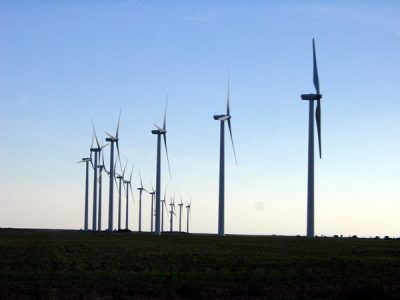RALEIGH — A flap already in the newly sworn-in General Assembly over wind energy foretells a continuing battle over renewables, and going into the session that convenes next week, deep divides persist between House and Senate members on a number of other key environmental issues that stalled last year.

One stark indicator of the standoff is in the schedule of the Environmental Review Commission, a joint House and Senate committee that is charged with reviewing policy proposals, annual and quarterly reports from regulators and studies mandated by legislation.
Supporter Spotlight
The commission, by far the largest source of environmental legislation for more than a decade, usually meets in the interim to go over studies and prepare legislation ahead of a session. It hasn’t met since April 13, 2016, and has yet to schedule a meeting ahead of the session, which starts back up Jan. 25.
“It’s certainly been more difficult to read than in recent years,” said Grady McCallie, policy director for the North Carolina Conservation Network and a veteran analyst of the legislature.
McCallie said that, given the interest, some kind of green energy legislation is a strong possibility. “But what’s actually going to happen is hard to say.”
Renewable Fight Renewed
When the breakdown of an end-of-session deal brokered by House and Senate leaders led to the abrupt adjournment of the 2016 regular session, one of the major pieces of legislation left undone was another regulatory omnibus, the Regulatory Reform Act of 2016.
The bill included several coastal-related provisions, including looser sandbag rules and sand-quality exemptions to allow the use of shoal sand for beach re-nourishment. It also included controversial changes that doubled the allowable amount of stream beds that could be damaged during development.
Supporter Spotlight
What the regulatory bill did not contain were hotly contested provisions on electronics recycling and wind energy, two areas in which negotiators from both chambers could not reach a deal.
The legislation saw another brief flicker of life again late last year on Dec. 14, when the compromise left on the table at the end of the regular session was introduced in the House during the penultimate special session. The Senate failed to take it up.
Rep. Chuck McGrady, R-Henderson, who introduced the legislation, said after the session that the bill was another attempt to get the provisions in agreement between the chambers passed.
But the bill stalled again on three provisions pushed by the Senate, primarily, wind-energy provisions pushed by Jacksonville Republican Harry Brown, the Senate Majority Leader.
Arguing that the proliferation of wind farms in eastern North Carolina would be in conflict with military training, Brown had tried to move a bill at the end of the regular session that would have greatly curtailed areas in the east where wind power facilities could be located.
In arguing for the bill, Brown said the state could lose military bases if not adopted. When it stalled in the House, Brown took the unusual step of emailing every member.

“You will not likely be faced with a more important choice with regard to the military in your careers here,” Brown wrote before a crucial House vote. “Choose wisely.”
When the bill failed to pass, Brown vowed to bring it up again this year.
Last week, the issue came roaring back with the release of a letter Brown signed, along with other House and Senate leaders and several coastal legislators, to Trump transition headquarters. The letter calls for a newly completed wind farm in Pasquotank and Perquimans counties to be shut down over potential conflicts with military radar.
The letter asks Gen. Robert Kelly, the Trump administration’s pick for secretary of Homeland Security, to halt the project, saying it was only allowed to be built because of the Obama administration’s “politically correct” energy policy.
“We are hopeful that you and the new administration will have a considerably different energy policy,” the letter states.
The project, which is expected to start generating electricity in the next month, is part of an aggressive move by Amazon to add renewable energy sources for its facilities.
Rep. Bob Steinburg, R-Chowan, whose district includes the wind farm, said the letter is another chapter in a long-running fight against renewable energy and another example of the use of the military and the legislature’s support for the military to defeat wind farms.
Opponents of wind farms have cited military sources, he said, but said they can’t come forward on the record out of fear they’ll anger their superiors.
Steinburg said he’s yet to meet one and called the idea that wind energy and the military can’t co-exist “a false narrative.” He said he’ll fight the push to shut down the wind farm.

“I don’t think they factually make the case that they’re trying to make,” he said. “If they can, I’d like to see it. I’ve yet to see it.”
The future of wind energy isn’t the only renewable up for discussion this year.
After a series of meetings looking at the impacts from the growing number of solar facilities, Rep. Jimmy Dixon, R-Duplin, and Environmental Review Commission chair, began a look at what the state might require regarding decommissioning the facilities.
While not a formal study, a report on Dixon’s stakeholder process is expected this month.
In addition to possible legislation on decommissioning solar facilities, the legislature is likely to also take up the effects solar development may have on farmland and the agricultural economy.
Last week, concerns raised about the potential loss of farmland to a 2,000-acre solar array prompted Currituck County commissioners to approve a two-month moratorium on solar farms. The pause is to allow county ordinances to be rewritten to tighten requirements.
Steinburg said the state’s policymakers need to face an important fact when it comes to renewables.
“Some of the biggest, fastest growing, 21st century companies in American have made the commitment to renewable energy,” he said. “By shutting the door on renewables we’re saying to all these companies, we’re economic Neanderthals.”
Legislation Already Pending
While committee work for this year’s session has been slow, it has not been stagnant.
Last week, the House Select Committee on Strategic Planning and Long Term Funding Solutions, which toured North Topsail Beach and New River Inlet last year, released its final report.
The report recommends the state take on a larger role in dredging navigational channels and inlets and allow for the wider use of dredged sand for beach re-nourishment.
It also calls for modernizing the state ports at Morehead City and Wilmington and improving rail and road access.
Also in early January, the Joint Legislative Administrative Procedure Oversight Committee indicated that a rewrite is coming of legislation that’s governed a three-year, global review of all state rules.
Under the change reviewed by the committee, all rules would be subject to a full review with public comment rather than only those deemed by each department to have substantial public interest.
At least one department is already raising questions about the change, which could expand the number of rules mandated for full review, including minor technical changes.
An attorney with the Department of Natural and Cultural Resources, which has numerous rules up for review this spring, told the committee that the new process would add substantial time and cost to the process.







